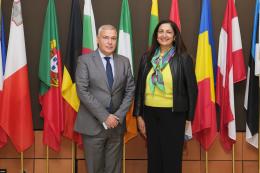European Economic
and Social Committee
Transzatlanti kapcsolatok
Az EU, az USA és Kanada közös értékei a demokrácia, az emberi jogok, valamint a gazdasági és politikai szabadság, emellett számos kül- és biztonságpolitikai kérdésben is hasonló az álláspontjuk. Az USA és Kanada az EU legfontosabb kereskedelmi partnerei közé tartoznak, és a nemzetközi jogrend kialakításában is partnerek. A transzatlanti kapcsolatok manapság új környezetben zajlanak, és egyre fokozódó kihívásokkal szembesülnek. Véleményünk szerint a civil társadalom e kapcsolatba történő bevonása a garanciája annak, hogy a transzatlanti kapcsolatok képesek legyenek megfelelni a polgárok elvárásainak, és hatékonyan hozzájáruljanak egy kölcsönösen előnyös együttműködés kialakításához.
Az EU és Kanada közötti átfogó gazdasági és kereskedelmi megállapodás (CETA), valamint a stratégiai partnerségi megállapodás 2016. október 30-án került aláírásra. E megállapodások végrehajtása során folyamatos civil társadalmi részvételre számítunk. Az EU és az Egyesült Államok közötti transzatlanti kereskedelmi és beruházási partnerségre (TTIP) irányuló tárgyalások jelenleg szünetelnek. A TTIP-tárgyalások azonban hozzájárultak az EU és az USA civil társadalma közötti kapcsolatok erősítéséhez, továbbá ahhoz, hogy a civil társadalom véleményt fogalmazzon meg azzal kapcsolatban, hogy milyeneknek kell lenniük az EU és USA közötti jövőbeli kereskedelmi kapcsolatoknak. Ezeket az eredményeket nem szabad veszni hagyni. A transzatlanti kapcsolatokat nyomon követő bizottságunkat 2014 szeptemberében alakítottuk meg azzal a megbízatással, hogy kísérje figyelemmel a tengerentúli civil társadalomhoz fűződő kapcsolatokat, és rendszeresen szervezzen párbeszédet, valamint konzultációt az USA-val és Kanadával fenntartott kapcsolatokat érintő kérdésekről.



